Ever caught yourself thinking, “If I just fix this one more thing about me, I’ll finally be okay”? Yeah, that’s the sneaky trap of self-improvement anxiety it starts as motivation but ends up feeling like a never-ending treadmill. This article unpacks that quiet pressure where chasing personal growth turns into emotional exhaustion, leaving you drained instead of empowered.
We’ll start by exploring why “working on yourself” can flip into stress, share a real-life peek into the struggle, define what this anxiety really is, highlight how it differs from healthy development, and spot the signs showing up in your everyday life. For more on tuning into your emotions without the overwhelm, check out our piece on why your emotions feel too much. And if you’re curious about the science behind it, here’s a solid read from Verywell Mind on self-improvement pitfalls. Stick around for our free self-check quiz later on to gauge your own growth pressure levels.
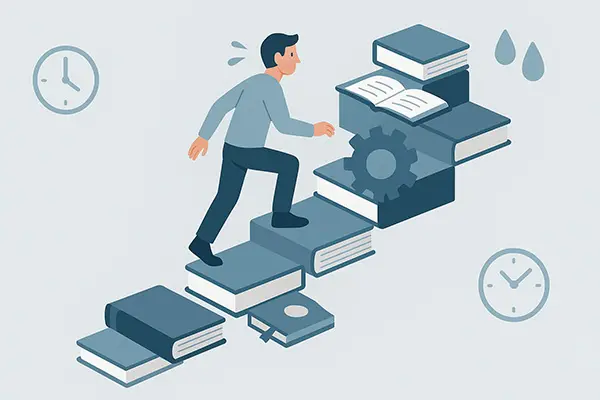
Why “Working on Yourself” Can Quietly Turn Into Anxiety

It sneaks up on you, doesn’t it? One day you’re excited about that new journaling app or therapy podcast, thinking it’ll unlock the “better” version of you. Next thing, you’re lying awake at 2am, stressing over why you’re not progressing faster. I remember flipping through self-help books like they were my lifeline, but instead of feeling lifted, I felt heavier like nothing was ever good enough. This shift happens because society’s obsessed with constant optimization; we’re bombarded with messages that scream “level up or fall behind.” And in the mix, what starts as self-care morphs into this relentless chase, where downtime feels like laziness and every flaw screams for immediate fixing.
From a neuro perspective, it’s wild your brain’s reward system gets hooked on the high of “progress,” but when real life throws curveballs, that dopamine dips, leaving anxiety in its wake. Think about it: hormones like cortisol spike when you’re always scanning for what’s “wrong” with you, turning growth into a survival game. Embrace pauses they’re not setbacks, they’re recharge zones. Oh, and a little joke: why did the self-improver cross the road? To get to the next level… but forgot to enjoy the walk! ?
A Personal Glimpse Into Growth Pressure
Picture this: I was at a cozy coffee shop last fall, sipping my latte, when a friend casually asked, “So, what are you working on these days?” I froze. My mind raced through my mental list meditation streak, reading goals, fitness trackers and suddenly, it hit me like a cold splash. I wasn’t just growing; I was pressuring myself into it, like some kinda self-imposed boot camp. Back in college, I pushed through burnout thinking it was “building resilience,” but really, I was ignoring how exhausted my body felt, all jittery and on edge. That moment in the cafe? It was my wake-up realizing that chasing self-betterment had me judging every quiet day as a failure.

And hey, if you’re in the LGBT+ community, this pressure can hit even harder. Navigating identity in a world that’s not always welcoming often amps up the need to “prove” yourself through constant improvement, like overachieving to counter stereotypes or internalized doubts. I chatted with a queer friend who shared how therapy helped her unpack that shifting from “I must fix myself to fit in” to “I’m worthy as I am.” It’s exhausting, but recognizing it? That’s the first gentle step toward freedom. One study from neuroscience angles shows how chronic self-criticism lights up the same brain areas as physical threat, no wonder it feels so draining. ?
What Is Self-Improvement Anxiety?

True growth should bring peace, not constant punishment.
Self-improvement anxiety is that nagging voice whispering you’re never quite “there” yet, turning personal development into a source of stress rather than joy. It’s like being on a hamster wheel of workshops, apps, and goals, where the finish line keeps moving. Unlike burnout from work, this one’s sneakier it’s self-inflicted, rooted in the fear that if you stop striving, you’ll somehow fall short as a person. I once spent weeks obsessing over productivity hacks, only to crash harder because I ignored my need for real rest.
From a psych viewpoint, it’s tied to perfectionism and societal hustle culture, where influencers flaunt their “glow-ups” making us feel inadequate. But here’s a twist: in evolutionary terms, our brains are wired for improvement to survive, yet modern life overloads that instinct, leading to chronic unease. Self-improvement anxiety often peaks when you tie your worth to progress metrics, leaving little room for just being. Ha, it’s like upgrading your phone every month sure, it’s shinier, but do you really need it? ?
Defining the Hidden Pressure of Constant Growth
At its core, this anxiety builds from the unspoken rule that you must always be evolving, or else you’re stagnant. It’s the pressure cooker of endless to-do lists for your soul read more, meditate better, network harder all while whispering, “You’re not enough yet.” I felt it creep in during a yoga retreat; instead of relaxing, I was mentally noting how “unflexible” I was compared to others. Silly, right? But that’s the hidden part: it disguises itself as ambition.

Psychologists link it to imposter syndrome, where even achievements feel hollow because the goalpost shifts. And culturally? In high-achieving circles, pausing is seen as weakness, especially for marginalized folks pushing against biases. One external insight: Psychology Today dives into how this cycle fuels mental fatigue. Add in hormonal shifts like adrenaline from constant “fixes” and you’ve got a recipe for exhaustion. ?
How It Differs from Healthy Self-Development
Healthy self-development feels like a gentle nudge forward, fueled by curiosity and self-kindness, not fear. It’s choosing a new habit because it lights you up, not because you’re “broken” without it. With anxiety, though, it’s compulsive like you have to improve or risk unworthiness. I learned the difference when I swapped rigid goals for flexible ones; suddenly, missing a day didn’t feel like catastrophe.
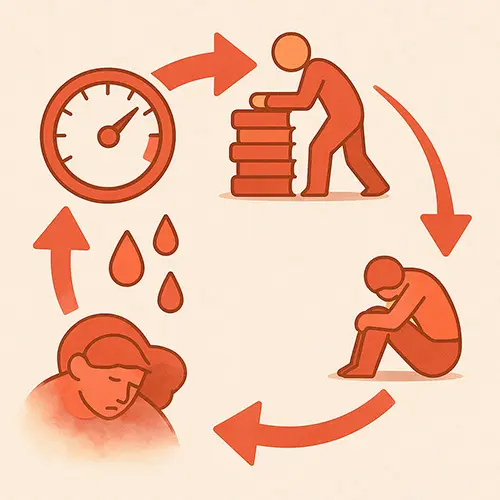
Key diff: healthy growth includes rest and celebration, while the anxious version skips those, leading to burnout. Neuro-wise, one activates reward pathways sustainably, the other spikes stress responses. For LGBT+ peeps, healthy dev might mean affirming spaces without the added layer of “proving” resilience through overwork. “Growth should feel expansive, not constricting,” as one therapist put it. Spot the shift early, and you save yourself heaps of strain. ?

Signs of Self-Improvement Anxiety

You might not even notice it at first, but these signs creep in like uninvited guests, turning your inner world upside down. It’s that subtle shift where motivation sours into must-dos, leaving you wired yet wiped. From emotional twinges to daily habits, spotting them is key to dialing back. I ignored mine for months, thinking it was “dedication,” until a friend pointed out how tense I seemed.
A quick science nugget: this anxiety often ramps up amygdala activity, making flaws feel like threats. Watch for that inner critic turning up the volume it’s a red flag, not reality. And yeah, sometimes it’s funny in hindsight like obsessing over a “perfect” morning routine that left me grouchy all day. ?
Common Emotional and Behavioral Indicators
Emotionally, it’s a rollercoaster of guilt, frustration, and that nagging “not enough” vibe. Behaviorally? You’re always on the hunt for the next fix, but satisfaction’s fleeting. It’s exhausting, like chasing a mirage. One real-life example: during a tough work phase, I dove into podcasts nonstop, but ended up more anxious about “lagging behind.”
Constantly reading, seeking tools, and never feeling enough
This one’s a classic you hoard books, apps, courses, thinking each will be the magic key. But post-binge? Still hollow. I stacked my nightstand with self-help gems, yet felt more inadequate. It’s the illusion of progress without pause. Synonym alert: this endless questing drains your energy reserves.

Comparing growth speed with others
Scrolling through socials, seeing everyone’s “wins,” and bam your pace feels snail-like. “Why aren’t I there yet?” I did this with a buddy’s promo, forgetting our paths differ. It breeds resentment, not inspiration.
Judging setbacks as failure
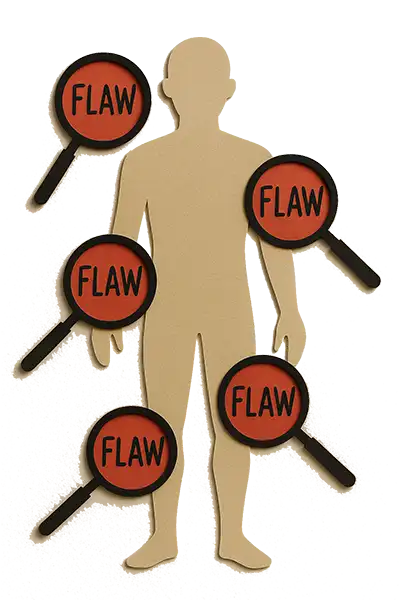
A slip-up? Total disaster in this mindset. Healthy view: setbacks teach. But here, they’re proof you’re flawed. After missing gym sessions, I beat myself up instead of adjusting gently.
How It Shows Up in Daily Life
In the nitty-gritty, it’s hyper-alertness to “issues,” making chill time impossible. Your nervous system’s on high, scanning for fixes like a faulty radar. Life feels like a perpetual audit. For me, even weekends turned into “productivity checks.”
Nervous system hypervigilance for flaws
Your body’s wired for threat detection, but now it’s internal every mood dip or lazy day flags as “problem.” It’s like having an overzealous alarm system. Adrenaline keeps you buzzing, but crashes follow.
Difficulty resting or feeling “done”
Rest? What’s that? You push through, fearing stagnation. I struggled with “done” lists, always adding more. It robs joy from now.
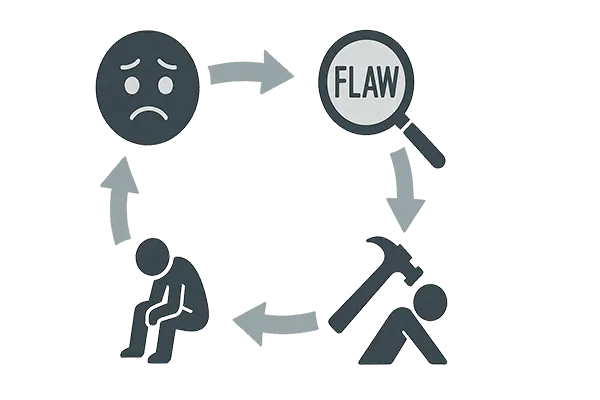
Causes and Roots of Growth Pressure
Okay, let’s dig into what really kicks this self-improvement anxiety into gear. It’s not like it pops up outta nowhere there’s usually a mix of outside influences and inner stuff brewing it up. I mean, think about how we’re bombarded daily with “be better” vibes, right? We’ll break down the big players here, starting with that endless scroll on social media and the whole self-help scene, then zoom in on perfectionism and shame sneaking in like uninvited guests. Oh, and if you’re wondering how this ties into broader emotional stuff, peek at our chat on navigating intense emotions it hits similar notes on feeling overwhelmed.
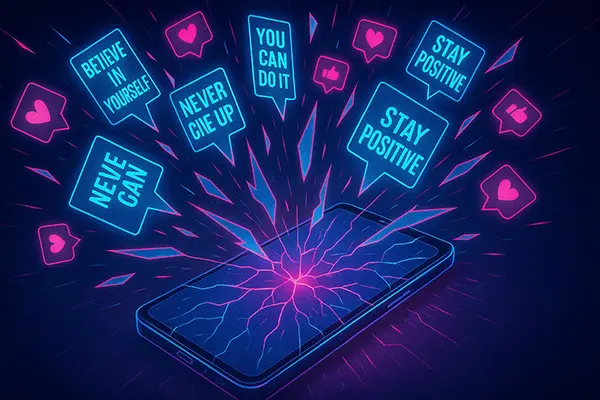
Influence of Self-Help Culture and Social Media
Self-help culture’s everywhere these days, promising quick fixes and glow-ups that make you feel like you’re always one book away from perfection. But honestly, it often amps up the pressure instead of easing it. I remember scrolling through Instagram reels late at night, seeing folks share their “morning routines” with green smoothies and meditation next thing I know, I’m beating myself up for hitting snooze. That constant highlight reel? It fuels this idea that everyone’s crushing it but you.
And social media? It’s the rocket fuel. Platforms like TikTok or LinkedIn push endless content on productivity hacks and transformation stories, making normal life feel inadequate. A study from Verywell Mind points out how this comparison game spikes anxiety levels, turning self-growth into a competition. From a neuroscience angle, it’s fascinating dopamine hits from likes trick your brain into craving more “progress,” but when reality doesn’t match, cortisol floods in, leaving you wired and worn out. Ha, it’s like chasing a carrot on a stick that’s actually a hologram. ?

For folks in the LGBT+ community, this hits different sometimes. Navigating identity in a world full of filtered “success” stories can add layers maybe you’re pushing harder to “prove” resilience against stereotypes, turning self-help into survival mode. I talked to a trans friend who said scrolling queer influencers felt inspiring at first, but soon it morphed into “why aren’t I farther along?” It’s exhausting, but recognizing that media’s curated BS is a start.
Role of Perfectionism and Shame
Perfectionism sneaks in quiet, like that voice whispering you’re only as good as your last achievement. It’s rooted deep, often from childhood stuff maybe parents praising straight A’s or society tying worth to output. Shame joins the party, making every “flaw” feel like a personal failure. I once skipped a therapy session cuz I felt ashamed for not “improving” fast enough ironic, huh?
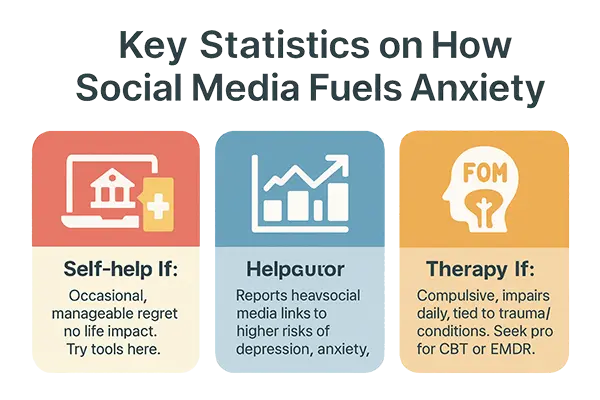
This duo turns growth into punishment. Psychologically, it’s linked to internalized beliefs where mistakes equal unworthiness, per Psychology Today articles on shame cycles. Hormonally, shame triggers adrenaline rushes that keep your nervous system on alert, scanning for fixes nonstop. It’s not just mental; it shows physically, like that tight chest when you “fall short.” Try noticing shame without judging it softens over time. And a little pun: perfectionism’s like a bad date it promises the world but leaves you empty.
🟨 > Key Statistics on How Social Media Fuels Anxiety
- A MIT study found college Facebook access boosted severe depression by 7% and anxiety by 20% source.
- HelpGuide reports heavy social media links to higher risks of depression, anxiety, and loneliness source.
- UC Davis Health notes it sparks FOMO, worsening overall wellbeing source.
These numbers show it’s not just in your head media’s design keeps us hooked and stressed.
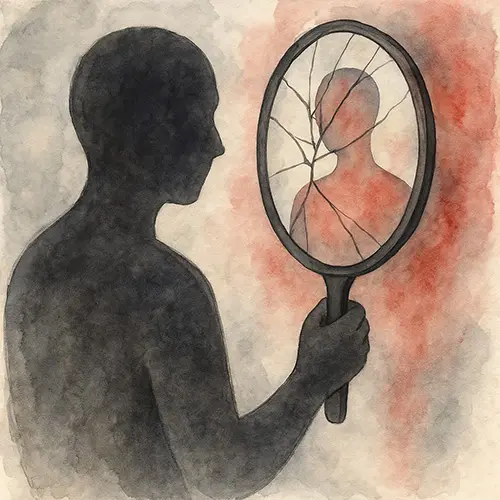
Comparing Self-Improvement Anxiety to Similar Issues
Now, how does this stack against stuff like perfectionism or burnout? They’re cousins, sure, but not identical twins. We’ll compare ’em head-on, spotting overlaps and differences to clarify your own feels. If burnout rings a bell, our guide on mental self-care has tools to unwind.
Self-Improvement Anxiety vs. Perfectionism
Self-improvement anxiety’s that endless chase for betterment, driven by fear of stasis. Perfectionism? It’s more about flawless outcomes, where anything less feels catastrophic. Overlap: both breed self-criticism. But anxiety pushes constant action, while perfectionism paralyzes with fear of starting wrong. I dealt with perfectionism in grad school rewriting papers til dawn, freakingout over commas. Anxiety kicked in later, with apps tracking “growth streaks.” Neurologically, both light up fear centers, but anxiety adds compulsion loops.
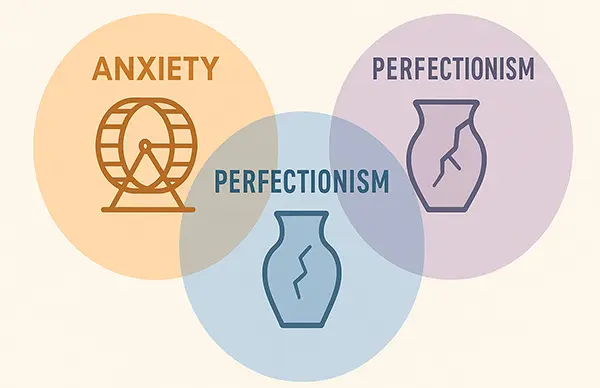
Self-Improvement Anxiety vs. Burnout
Burnout’s total exhaustion from overdoing, often work-related. Self-improvement anxiety? It’s self-inflicted fatigue from inner hustling. They overlap in drain and irritability, but burnout hits when you ignore limits, while anxiety keeps you grinding despite ’em. Picture burnout as crashing after a marathon; anxiety’s running on a treadmill that speeds up. From Harvard Health, burnout spikes inflammation hormones, similar to anxiety’s stress response. ? One burns you out externally, the other from within.
| 🟨 | Aspect | Self-Improvement Anxiety | Perfectionism | Burnout |
|---|---|---|---|---|
| Core Driver | Fear of not growing enough | Need for flawless results | Overexertion without recovery | |
| Key Symptom | Compulsive self-fixing, never “done” | Paralysis from fear of imperfection | Total emotional/physical drain | |
| Overlap | Self-criticism and exhaustion | High standards leading to stress | Fatigue from relentless effort | |
| Difference | Focus on ongoing progress | Obsession with error-free output | Collapse after prolonged push | |
| Recovery Tip | Embrace acceptance | Allow “good enough” | Prioritize rest and boundaries |
Stages of Breaking Free from Growth Anxiety
Breaking free ain’t a straight line it’s more like untangling headphones. We’ll walk through stages: first owning the pressure, then seeing healing as cycles, and weaving in rest. It’s gradual, but worth it. For more on acceptance, check knowing yourself for self-care.
Acknowledging the Pressure
First step? Admit it’s there. Sounds simple, but ignoring it lets it fester. I journaled one night, listing pressures social feeds, family expectations and bam, relief hit. It’s like shining light on shadows. Psych view: acknowledgment calms the amygdala, reducing fight-or-flight. Yeah, saying “I’m pressuring myself too much” is powerful.

Shifting to Cyclical Healing (not linear)
Healing’s not a ladder; it’s seasons growth, rest, reflection repeating. Linear thinking traps you in “faster, better.” I learned this hiking: paths loop back, but you advance. Evolutionary wise, humans thrive in cycles, like sleep-wake. Ditch timelines; flow with ebbs.
Integrating Rest and Acceptance
Weave rest in, accepting you’re enough now. Acceptance isn’t quitting it’s kindness. I started “do nothing” afternoons, guilt-free. Hormonally, rest lowers cortisol, boosting serotonin for calm. ? Rest’s your secret weapon.

Practical Tools and Exercises for Releasing Pressure
Tools time! These are everyday hacks to ease the grip. We’ll cover mantras, journaling, boundaries, and ditching comparisons. Pair ’em with our emotional self-care tips for extra oomph.
Daily Mantras and Affirmations
Mantras rewire that inner chatter. Try “I’m growing at my pace” mornings. I mutter it brushing teeth silly, but sticks. From positive psych, affirmations build neural paths for self-compassion. Repeat: “Progress, not perfection.”
Journaling Without Judgment
Dump thoughts sans critique. I scribble “what pressured me today?” freely. No fixing, just venting. It clears mental fog. Studies show journaling drops anxiety by processing emotions.
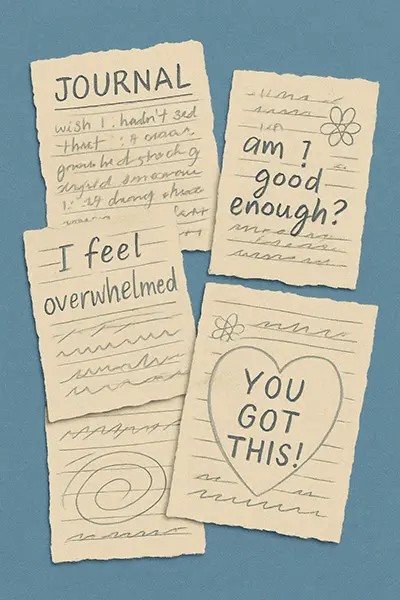
Boundary-Setting Techniques
Set limits like “no self-help after 8pm.” I told friends “I’m offline for growth stuff.” It protects energy. Technique: visualize a shield against pressures. External read: Boundaries guide from Mayo Clinic.
Limiting Comparison Triggers (online & offline)
Unfollow accounts sparking envy; curate feeds for realness. Offline, skip convos on “wins.” I muted groups peace followed. App blockers help too. It’s about curating your world.
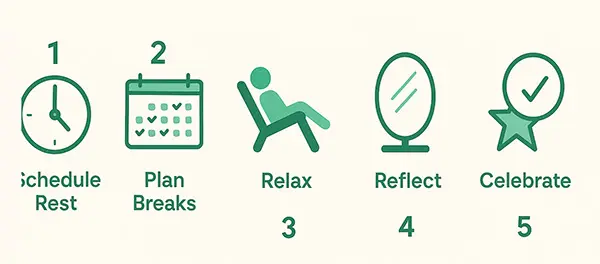
Real-Life Scenarios and Case Studies
You know, sometimes hearing someone else’s story hits different it makes all this abstract stuff feel real. Like, I’ve chatted with folks who were deep in that growth grind, and their journeys from overwhelmed to balanced? Eye-opening. We’ll share a couple tales here, nothing fancy, just raw glimpses into how constant self-fixing can backfire… but also how tiny shifts bring relief. If this resonates, our piece on knowing yourself dives deeper into spotting those inner patterns without the pressure.

Stories of Overwhelmed Seekers Finding Balance
Take Sarah, a 32-year-old marketer I met at a wellness meetup last summer. She was all in on self-improvement podcasts every commute, yoga apps tracking her streaks, even therapy twice a week. Sounded great, right? But she confessed over coffee how it left her anxious, always scanning for “what’s next to fix.” One day, after a panic attack from missing a meditation session, she hit pause. Switched to walking in the woods no apps, just listening to birds and her own thoughts. Slowly, that knot in her chest loosened. Now she grows on her terms, not some influencer’s schedule. ?

Or think about Alex, a queer artist in their late 20s navigating identity in a not-so-welcoming town. For them, self-help books on resilience felt like armor against discrimination, but it turned into this exhausting cycle of “I must be stronger.” Therapy helped unpack that pushing through burnout wasn’t heroism; it was ignoring their needs. Alex started small, like doodling without judging the outcome, and found peace in just being. In the LGBT+ world, where societal pressure amps up the need to “overcome,” stories like this remind us growth doesn’t mean constant battle. From a neuro angle, these shifts lower cortisol spikes, letting serotonin flow for that calmer vibe. Ha, it’s like upgrading from a treadmill to a scenic hike you actually enjoy the view.
Checklist for Balanced Personal Growth
Alright, let’s keep it simple a quick checklist to spot if your growth game’s tipping into anxiety territory. No judgment, just gentle nudges to check in with yourself. Print this out, stick it on your fridge, whatever works. For more on emotional check-ins, peek at mental self-care.
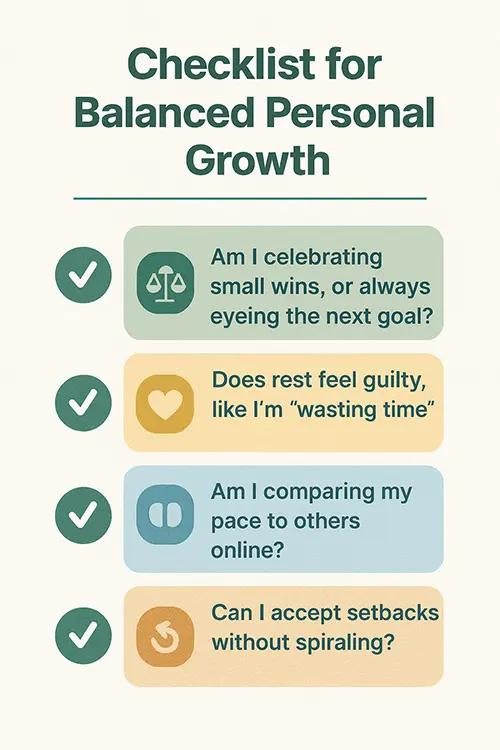
- Am I celebrating small wins, or always eyeing the next goal?
- Does rest feel guilty, like I’m “wasting time”?
- Am I comparing my pace to others online?
- Can I accept setbacks without spiraling?
- Is growth feeling fun, or like a must-do chore?
Warning Signs and When to Seek Professional Help
Sometimes that growth pressure sneaks past “just stressed” into something heavier, and ignoring it? Not great. We’ll flag those red alerts here, plus tips on finding help because you don’t have to solo this. If overwhelm’s your vibe, our take on emotional boundaries might help draw those lines early.
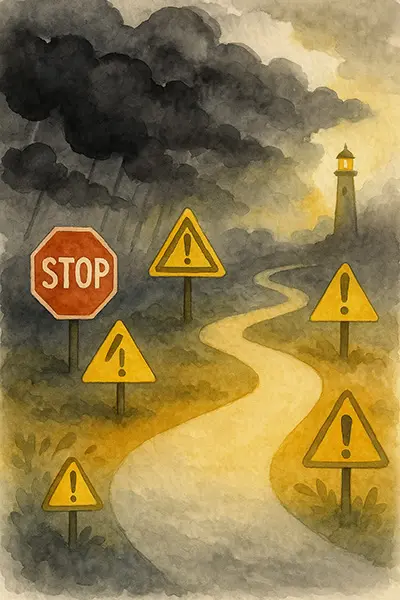
Red Flags Indicating Deeper Issues
Watch for these they’re like your body’s SOS. Constant fatigue even after sleep, that jittery feeling in your gut all day, or snapping at loved ones over nothing. I remember a phase where I’d wake up panicky, mind racing through my “flaws” before coffee. If isolation kicks in, avoiding friends cuz you feel “not improved enough,” that’s a big one. Or if joy’s MIA, everything tinted gray? Yeah, could tie to deeper anxiety or depression. Psych studies show chronic self-criticism ramps up amygdala activity, making threats outta everyday stuff. Don’t brush it off; it’s your cue to slow down.
Tips for Finding a Therapist
Finding the right therapist? It’s like dating gotta click. Start with directories like Psychology Today filter for self-improvement burnout or anxiety specialists. Ask about their approach maybe CBT for rewiring thoughts, or somatic for body-held stress. I found mine through a friend’s rec, and that first session? Whew, relief. Go for a free consult, see if they get your vibe. For LGBT+ folks, seek affirming pros via The Trevor Project or GLAAD resources they understand those extra layers. Cost-wise, check sliding scales or apps like BetterHelp. Remember, seeking help’s strength, not weakness. ?

Research, Studies, and Statistics on Self-Growth Pressure
Diving into the science yeah, this isn’t just vibes; there’s data backing how constant optimization messes with our heads. We’ll hit key findings here, pulling from psych research on why that endless improvement loop leads to burnout. For a broader look at mental wellness, check why emotions feel overwhelming.
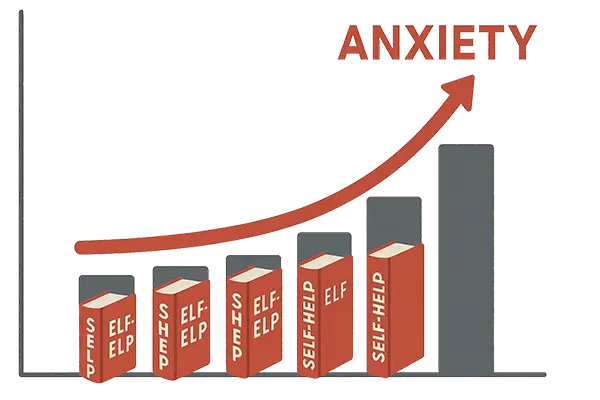
Key Findings from Psychology Studies
One eye-opener: a study found no full overlap between burnout and anxiety, but constant self-push amps both, creating robust stress constructs. Another from Forbes talks “betterment burnout,” where drive for improvement flips to fatigue and frustration. I mean, imagine grinding on habits only to crash harder it’s like your brain’s reward system gets hijacked. From Frontiers, positive emotions in self-improvement can mediate better outcomes, but without ’em? Straight to exhaustion. Neuro-wise, over-optimization spikes cortisol, eroding creativity per InsideHook. And in self-help culture, that $11 billion industry often fuels anxiety by promoting nonstop hustle. Ha, it’s ironic chasing happiness makes ya miserable.
| 🟨 | Statistic | Impact | Source |
|---|---|---|---|
| $11 billion self-improvement industry | Fuels constant optimization, linked to higher anxiety | Harvard Business Review | |
| Rising adolescent mental health issues | Tied to nonstop self-improvement culture | Jake Ernst Substack | |
| Over-optimization leads to burnout | Increases fatigue and distorted self-sense | TrueSelf | |
| Hustle culture worsens anxiety/depression | Causes work-related stress and burnout | Talkspace | |
| Imagining better future lowers happiness | Self-improvement fantasies reduce later joy | TIME |
Frequently Asked Questions (FAQ)
Got questions bubbling up? Totally normal. We’ll tackle the big ones here, straight talk no fluff. These come from real chats I’ve had, plus psych insights to keep it grounded.

It’s that gut check when growth feels optional, not urgent. Like, if you’re content in the now without chasing fixes? You’re there. Listen to your body if rest feels earned, not guilty, you’ve hit “enough.” One trick: journal weekly wins without adding to-dos.
Nah, curiosity’s cool but when it turns compulsive, yeah, red flag. Balance it with acceptance, or it drains ya. Studies show endless striving spikes anxiety. Mix in playtime growth without goals.
Fear’s sneaky, but pausing ain’t stopping; it’s recharging. Think cycles, like seasons. I worried too, but breaks sparked fresh ideas. From psych, rest boosts resilience.
Cuz culture sells it that way endless upgrades. But life’s not a level-up game; it’s messy. Shift to “good enough” mindset, and it eases. Ha, like upgrading your phone forever you’d go broke!
Small doses: pick one habit monthly, weave in rest. Track energy, not streaks. For burnout vibes, our self-care struggles has real fixes.
Heck no it’s smart strategy. Pauses let insights sink in. Think athletes they train, then recover. Giving up’s quitting joy; this is sustaining it.
Brain’s wired to spotlight negatives survival thing. But setbacks teach more than wins. Reframe: “What’d I learn?” Lowers that failure sting. ?
Resources and Reliable Links
Wrap this up with some solid reads no overwhelm, just picks to dip into when ready. These helped me untangle my own growth knots.
Books, articles, and trusted psychology websites for further reading
Books: “Unwinding Anxiety” by Judson Brewer great for breaking worry cycles. Or “The Gifts of Imperfection” by Brené Brown, all about ditching perfect for realness. Articles: Check Psychology Today’s take on self-improvement without stress. Forbes on overcoming betterment burnout. Trusted sites: ADAA for anxiety books, or Positive Psychology for self-esteem reads. And for emotional healing, our intense emotions guide. Dive in at your pace you got this. ?
So, if all this hit home, why not try one small pause today? Grab a coffee, breathe, and remind yourself: you’re enough right now. Share your story in comments or hit up therapy if needed. Let’s break free together. ??

✨ Last updated on 02.09.2025
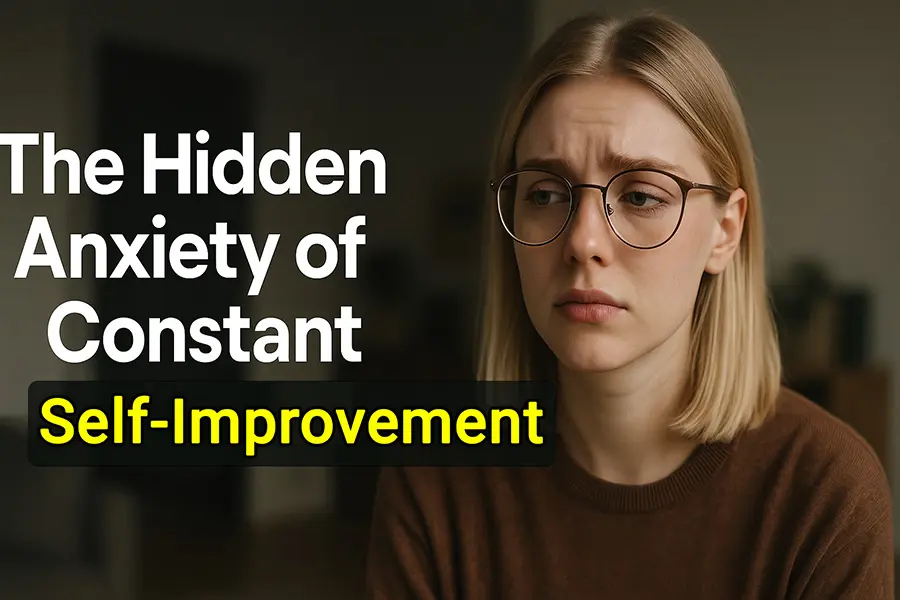










Leave a Reply